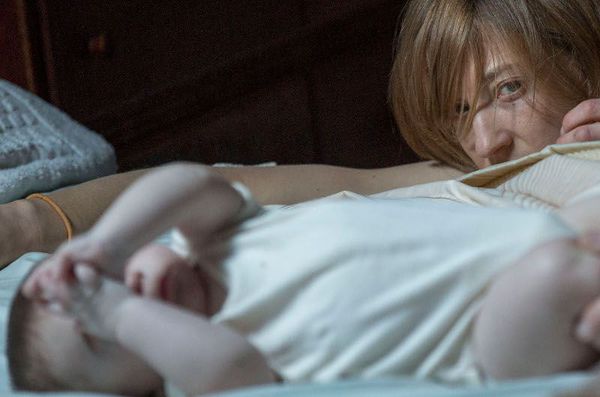Eye For Film >> Movies >> Hungry Hearts (2014) Film Review
Hungry Hearts
Reviewed by: Anne-Katrin Titze

We enter a turquoise bathroom with a stuck door of a Chinese restaurant in New York City, where Mina (Alba Rohrwacher), in a lemony blouse, meets Jude (Adam Driver) and their lives will never be the same. Absurdly funny and simultaneously cracking open the door into the territory of the body and its functions, shame and rescue precariously co-exist. Hungry Hearts, adapted from Marco Franzoso's novel The Indigo Child by writer/director Saverio Costanzo, is many things - a thriller, a deep hard stare into the nature of escape, a comedy of metaphors and an alluringly photographed glimpse into the abyss.
Rohrwacher and Driver breathe so much of their characters' unconscious motivation into the tiniest reactions that it feels as though we truly get to watch their thoughts transforming. And these thoughts are often highly disturbing.

When Mina is told that the Italian Embassy, where she works, is planning to transfer her, she and Jude decide to get married. And she has a recurring nightmare which could have sprung skewed out of a David Lynch movie. A deer is being hunted during a stormy night on the boardwalk in Coney Island.
Mina, whose mother died when she was two, looks forlorn in the big city, an ageless little girl in spirit, herself becoming a mother without knowing what that is supposed to mean. Costanzo shoots Rohrwacher from above, lost on the town, walking in flat brown lace-up ankle boots as though she just arrived from the mountains or the Kindertransport.
Adam Driver gives the performance of his career so far. His facial expressions explain to us in an instant how shame can be fatally dangerous and where well-intentioned passivity is not enough to save lives. That is an enormous accomplishment. Driver, who has been typecast as rather creepy characters displaying few sins of remorse as in John Curran's unvarnished Tracks or Noah Baumbach's hyper-real While We're Young, gives Jude a humanity that transcends the present.
Mina decides to consult a clairvoyant and learns that the baby in her belly is an "indigo child," sent from another planet to save the world. She takes the New Age label to her hungry heart, so much so that the purity of the child becomes obsession.
The small apartment on the Upper West Side of Manhattan, where Mina, Jude and their newborn child live, is a stone's throw from the Dakota building, home to another special baby. There is emotional intelligence, depth of perception, and a profound terror of being alive that connects both of these films. Whereas Polanski's Rosemary's Baby built much of the tension on the mother's doubt, Costanzo envelops Mina with a sheer impenetrable cocoon of conviction. She knows what is right for her child, full stop. As we are what we eat, food becomes the battleground for the baby's soul - and his body.
Avocados and lemons, beets grown in a little makeshift greenhouse on the roof of their apartment building are pitched against ham fed in a church. Nicholas Roeg in Don't Look Now made us see Venice through the eyes of Julie Christie and Donald Sutherland's Laura and John. Costanzo's New York, which includes Upstate Chappaqua, is that of his protagonists and dangerously overlaps with our own.
What does it mean to have responsibility for another being? Can the same thing that you think is good for you be fatal for another? Immanuel Kant's categorical imperative has an age limit. Hungry Hearts in its vital centre is about what nourishes us and what can lead us astray.
Reviewed on: 21 Apr 2015















